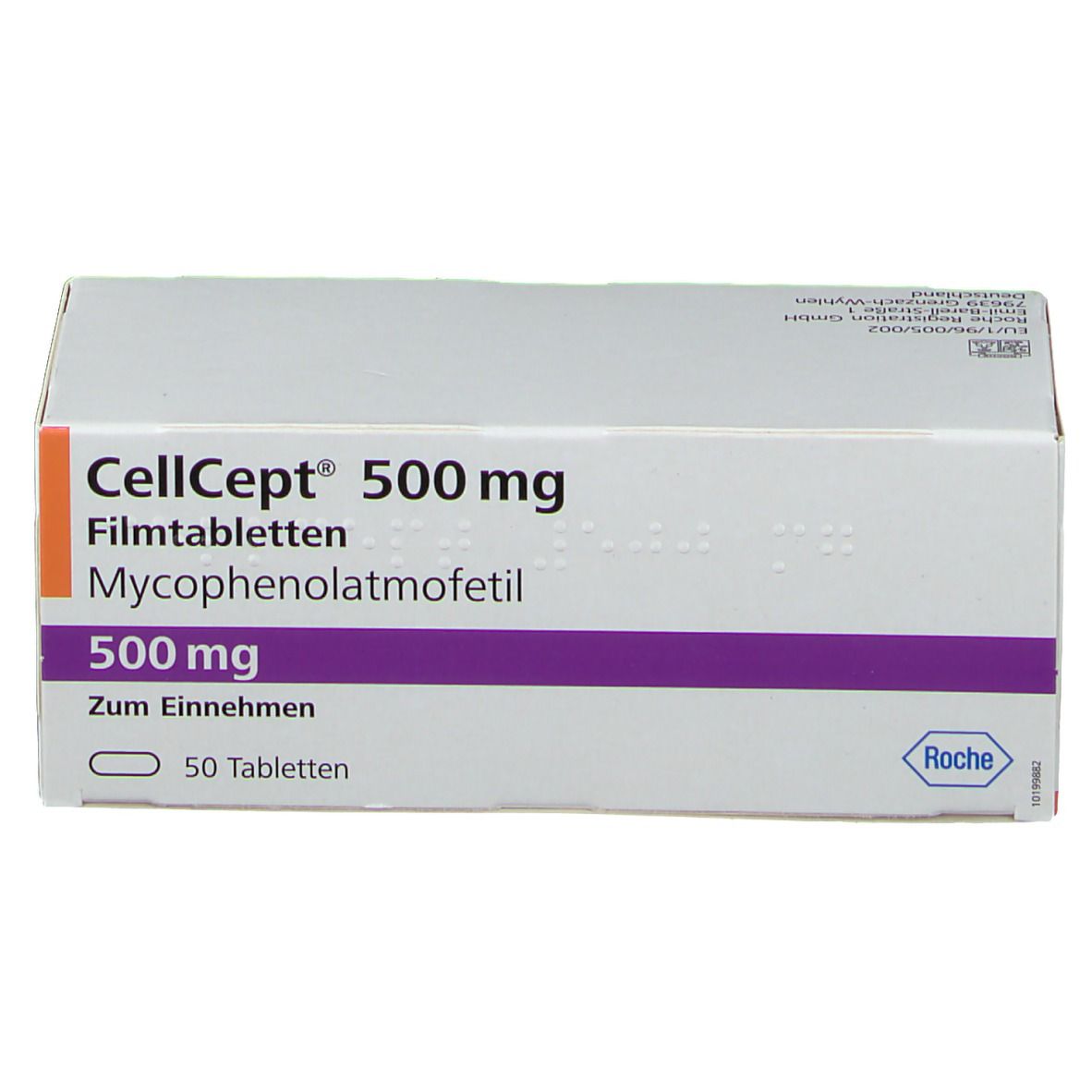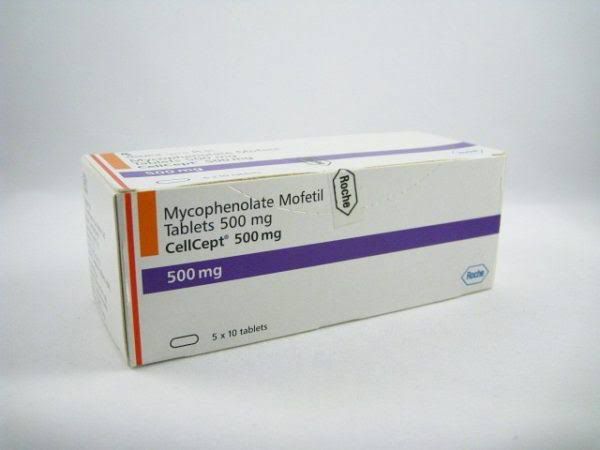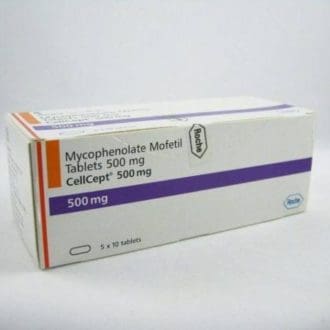Cellcept 500 mg tablet prezzo Mycophenolate Mofetil 500 mg
5 Strips x 10 Tabs
GENERIC NAME: MYCOPHENOLATE MOFETIL
What is CellCept?
- Cellcept 500 MG tablet, is the trade name for Mycophenolic acid, less accurately called mycophenolate. It is an immunosuppressant drug use to prevent rejection in organ transplantation. It inhibits an enzyme needed for the growth of T cells and B cells. Our immune system helps our body in fighting infections. While obtaining a new organ, our bodies treat the new organ as an invader, and the chances that the body will reject the organ are high. This medicine lowers our body’s immune system in order to help the body adapt and accept the donate organ.
- Organ transplant is a serious life-threatening procedure. For a body to accept an alien organ, it needs intensive care and the right internal environment. Common side effects surface from time to time, so it is necessary to not only monitor them but to take care of them right away as well, in order to ensure a hospitable environment for the donated organ and avoid rejection.
- Since Cellcept in an immunosuppressant, it is dangerous to even get exposed to a broken tablet or pill, since it can weaken up one’s immune system if not regulated and consumed properly and with proper guidance.
Pregnant Women:
- It is necessary for all pregnant women to consult their doctors thoroughly before and during opting for the treatment. For all the women who can get pregnant, it is suggested to take one pregnancy test a day before starting Cellcept and one 10-12 days after starting the treatment.
- She must use acceptable birth control during her entire CellCept therapy and continue birth control for 6 weeks after she stops taking CellCept.
- It is also an option to completely abstain from sexual intercourse. If a woman does get pregnant while taking Cellcept 500 MG tablet, she must not stop taking CellCept. Instead, the situation must be discussed with the doctor to take right steps to ensure health of both the woman and the unborn baby.
- Allergy: Anyone who is allergic to Cellcept, or any ingredient of Cellcept, should refrain from using it completely. An immunosuppressant will only create more troubles if an allergic reaction occurs and can prove to be really fatal for the patient.
- History: The patient must disclose all the ongoing treatments and medicines the patient is consuming beforehand. The doctor generally takes blood samples before and during Cellcept usage, to ensure the blood count stability.
- Side Effects: CellCept weakens the body’s immune system and its ability to fight infections, and since the body is left vulnerable during and after Cellcept usage, it becomes prone to viral infections and other hazardous conditions. Serious life-threatening infections like Cytomegalovirus (CMV), shingles, herpes, Hepatitis B and C and many other infections can happen and cause serious blood or tissue infections.
Usage
- Cellcept 500 MG prezzo tablet must use only if prescribed by a certified doctor. One must remain under intensive care with their vitals being regularly monitored while they are using Cellcept 500 MG prezzo tablet. The injection form of Cellcept 500 MG prezzo tablet is injected into a vein through an IV.
- Only a certified healthcare provider must be allowed to give this dosage. For oral consumption, CellCept must be taken on an empty stomach, at least 1 hour before or 2 hours after a meal. It shall not be crushed, chewed, broken, or even opened. It must be swallow whole and at once.
- The patient on Cellcept will be regularly monitor. Routine medical tests will be carry out from time to time to ensure that the medicine is not causing harmful effects. Blood samples will be collected regularly, and vitals will monitor closely to ensure complete safety of the patient.

How to use Cellcept 500 MG
- Read the Medication Guide provided by your pharmacist before you mycophenolate 500 mg start taking mycophenolate and each time you get a refill. If you have any questions, ask your doctor or pharmacist.
- Take this medication by mouth as directed by your doctor, usually twice daily on an empty stomach, 1 hour before or 2 hours after meals.
- Swallow the medication whole. Do not crush or chew.
- If the capsule comes apart or if there is dust from the tablets, avoid inhaling the powder or dust, and avoid direct contact with the skin or eyes. If contact occurs, wash the affected skin area well with soap and water or Cellcept 500 MG prezzo rinse your eyes with plain water. Consult your pharmacist for details.
Precautions
- Before taking mycophenolate mofetil, tell your doctor or pharmacist if you are allergic to it; or to mycophenolic acid; or to mycophenolate sodium; or if you have any other allergies. This product may contain inactive ingredients, which can cause allergic reactions or other problems. Talk to your pharmacist for more details.
- Before using this medication, tell your doctor or pharmacist your medical history, especially of cancer, liver disease (such as hepatitis B, hepatitis C), kidney disease, current/past infections (such as herpes, shingles), mycophenolate 500 mg stomach/intestinal problems (such as ulcers), rare genetic disorders.
- This drug may make you dizzy or drowsy. Alcohol or marijuana (cannabis) can make you more dizzy or drowsy. Do not drive, use machinery, or do anything that needs alertness until you can do it safely. Limit alcoholic beverages. Talk to your doctor if you are using marijuana (cannabis).
- Mycophenolate can make you more likely to get infections or may make current infections worse. Stay away from anyone who has an infection that may easily spread (such as chickenpox, COVID-19, measles, flu). Talk to your doctor if you have expose to an infection or for more details.
CellCept Dosing Information
- Usual Adult Dose for Organ Transplantation – Rejection Prophylaxis:
- Renal transplantation: 1 g orally or intravenously twice daily. Oral: 1 hour before or 2 hours after a meal.
Intravenous: administered for 2 hours. - Heart transplantation: 1.5 g intravenously twice daily administered over not less than 2 hours or 1.5 g orally twice daily.
- Liver transplantation: 1 g intravenously twice daily administered mycophenolate mofetil 500 mg over no less than 2 hours or 1.5 g orally twice daily.
- Usual Geriatric Dose for Organ Transplantation – Rejection Prophylaxis:
- Renal transplantation: 1 g orally or intravenously twice daily. Oral: 1 hour before or 2 hours after a meal.
Intravenous: administered for 2 hours. - Heart transplantation: 1.5 g intravenously twice daily administered over not less than 2 hours or 1.5 g orally twice daily.
- Liver transplantation: 1 g intravenously twice daily administered over no less than 2 hours or 1.5 g orally twice daily.
- Usual Pediatric Dose for Organ Transplantation – Rejection Prophylaxis:
Renal transplantation:
3 months or more: data not available
3 months or more:
Initial dose: 600 mg / m2 / dose twice daily to a maximum of 2 grams per day.
Usual Pediatric Dose for Nephrotic Syndrome:
Frequent recurrence:
Initial dose: 12.5 to 18 mg / kg orally twice daily for 1 to 2 years with a tapered dose of prednisone.
Maximum dose: 2 grams per day.
Depending on steroids:
Initial dose: 12 to 18 mg / kg or 600 mg / m2 orally twice daily.
Maximum dose: 2 grams per day.
Interactions
- Drug interactions may change how your medications work or increase your risk for serious side effects. This document does not contain all possible drug interactions.
- Keep a list of all the products you use (including prescription/nonprescription drugs and herbal products) mycophenolate mofetil 500 mg and share it with your doctor and pharmacist.
- Do not start, stop, or change the dosage of any medicines without your doctor’s approval.
- Some products that may interact with this drug include: mycophenolate 500 mg other drugs that weaken the immune system/increase the risk of infection (such as natalizumab, rituximab).
- This medication may decrease the effectiveness of hormonal mycophenolate mofetil 500 mg birth control such as pills, patch, or ring.
- This could cause pregnancy. If you are using hormonal birth control, you should use an additional non-hormonal form of birth control while using this medication. Discuss your options with your doctor or pharmacist.
- Also tell your doctor if you have any new spotting or breakthrough bleeding, because these may be signs that your birth control is not working well.
Warnings
- Mycophenolate may lower your ability to fight infections. This mycophenolate mofetil 500 mg may make you more likely to get a serious (rarely fatal) infection or make any infection you have worse. Tell your doctor right away if you have any signs of infection.
- Mycophenolate may rarely cause cancer (such as lymphoma, skin cancer). Protect your skin from the sun. Avoid prolonged sun exposure, tanning booths, and sunlamps. Use a sunscreen and wear protective clothing when outdoors.
- Tell your doctor right away if you have any of the following symptoms of cancer: swollen glands, sudden weight loss, night sweats, change in appearance or size of moles, or unusual skin changes/growth. Mycophenolate may harm an unborn baby. mycophenolate 500 mg When using mycophenolate.
Side Effects
- Constipation, nausea, headache, diarrhea, vomiting, stomach upset, gas, tremor, dizziness, drowsiness, or trouble sleeping may occur. If any of these effects last or get worse, tell your doctor or pharmacist promptly.
- Remember that this medication has prescribe because your doctor has judge that the benefit to you is greater than the risk of side effects. Many people using this medication do not have serious side effects.
- Tell your doctor right away if you have any serious side effects, including unusual tiredness, fast/irregular heartbeat, easy bleeding/bruising, swelling of the feet or ankles, joint pain/stiffness, muscle pain.
- Get medical help right away if you have any very serious side effects, including stomach/abdominal pain that doesn’t go away, black stools, vomit that looks like coffee grounds, chest pain, shortness of breath/rapid breathing.
Overdose
If someone has overdosed and has serious symptoms mycophenolate 500 mg such as passing out or trouble breathing, call 911. Otherwise, call a poison control center right away. US residents can call their local mycophenolate mofetil 500 mg poison control center at 1-800-222-1222. Canada residents can call a provincial poison control center.
Notes
Do not share this medication with others.
Lab and/or medical tests (such as blood counts, drug levels, kidney function, mycophenolate mofetil 500 mg pregnancy test) should be done while you are taking this medication. Keep all medical and lab appointments. Consult your doctor for more details.
Attend a transplant education class or support group. Learn to recognize the signs and symptoms of organ rejection and tell your doctor right away if they occur.
Missed Dose
If you miss a dose, mycophenolate 500 mg take it as soon Cellcept 500 MG prezzo as you remember. If it is near the time of the next dose, skip the missed dose. Take your next dose at the regular time. Do not double the dose to catch up.



